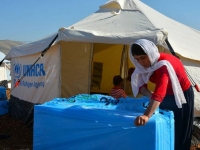Politics
Syria: EU strengthens sanctions against the regime and its supporters
Because the situation continues
USPA NEWS -
The situation in Syria continues to deteriorate, and the EU has reinforced restrictive measures against sponsors of the Syrian regime. Seven persons and six entities providing support to the Syrian regime as well as benefitting from it have been targeted with a travel ban and an EU asset freeze.
This brings the number of persons and entities targeted by EU sanctions over the violent repression against the civilian population in Syria to 218 persons and 69 entities. In December 2014, the Council reiterated that the EU would continue imposing and enforcing sanctions that target the regime and its supporters as long as repression continues. For the EU, a lasting solution to the conflict can only come through a Syrian-led political process that leads to a transition. The EU continues to encourage all efforts to this end. The legal acts, including the full detail of those targeted by the restrictions, are available in the EU Official Journal of 7 March 2015.
In December 2014 and between other conclusions, the EU expresses grave concern regarding the continued deterioration of the humanitarian and security situation in Syria. The EU condemns unreservedly the atrocities and human rights violations and abuses perpetrated by the Assad regime as well as ISIL / Da'esh, Jabhat al-Nusra and other terrorist groups. The EU will continue to encourage all efforts to reach a political solution by mutual consent in order to maintain the unity, sovereignty, territorial integrity as well as the multi-ethnic and multi-religious character of Syria. A lasting solution to the conflict can only be achieved through a Syrian-led political process leading to a transition.
The EU is committed to fully support the UN Special Envoy for Syria Staffan de Mistura's efforts to achieve a strategic de-escalation of violence as a basis for a broader sustainable political process. The EU stands ready to support concretely the development of his proposals, in particular the proposal to build on local freezes of hostility in compliance with international humanitarian law in Aleppo and elsewhere.
Reduction of violence will not be achieved without effective monitoring, preferably anchored in the United Nations Security Council. The EU recalls that cases of forced surrender imposed by the Assad regime through starvation sieges were labeled fallaciously as local ceasefires in the past. It expresses serious concern regarding the intensified military action by the Assad regime against areas held by the opposition, which threaten the UN Special Envoy Staffan de Mistura's initiative.
The EU will seek ways to provide practical support to his efforts notably by contributing to the revival of local governance and administration, to the restoration of basic services and to the return to normalcy in areas of reduced violence, in particular in Aleppo, as conditions allow. The EU recalls that the overall objective remains a Syrian-led process leading to a transition that meets the aspirations of all the Syrian people, based on the Geneva communiqué of 30 June 2012 and in line with relevant UNSC Resolutions.
The EU calls too on all Syrian parties to show clear and concrete commitment to this process, and to ensure the involvement of civil society and women. The EU is ready to engage with all regional and international actors with influence over the Syrian parties and calls on them to use their influence constructively towards this end. The EU condemns the continued widespread and systematic violations and abuses of human rights and international humanitarian law perpetrated in Syria, in particular by the Assad regime and terrorist groups, as reported by the Commission of Inquiry.
This includes indiscriminate bombings with barrel bombs by the regime forces and atrocities committed by ISIL / Da'esh. The EU welcomes the adoption of the UN General Assembly Third Committee resolution condemning human rights violations in Syria. It underlines its concern regarding cases of forced disappearances and calls for the immediate release of the victims. The EU will spare no effort to ensure that all perpetrators of such violations and abuses are held accountable for their crimes which may amount to crimes against humanity and war crimes. The EU reiterates its call to the Security Council to refer the situation in Syria to the International Criminal Court.
The EU urges all parties to comply with international humanitarian law as regards protection and access to humanitarian aid and to provide humanitarian aid to all people in need, including in hard-to-reach areas. The EU condemns the continued impediments in the delivery of aid for which the Assad regime bears the primary responsibility. The EU urges all parties, in particular the Syrian authorities, to fully and immediately implement all the provisions of UNSC Resolutions 2139 (2014) and 2165 (2014). The EU fully supports the renewal of the United Nations Security Council Resolution 2165 in order to foster effective cross-border and cross line assistance and ensure access to vulnerable people regardless of their location.
Liability for this article lies with the author, who also holds the copyright. Editorial content from USPA may be quoted on other websites as long as the quote comprises no more than 5% of the entire text, is marked as such and the source is named (via hyperlink).






